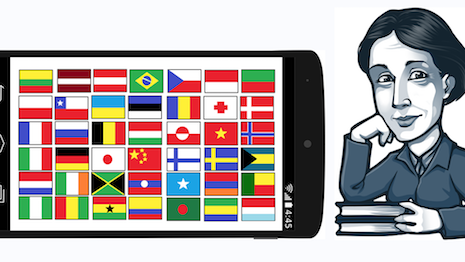By Gary Schwartz
Ninety years ago, Virginia Woolf stood in front of a hall packed with students and faculty from two women's colleges at Cambridge University.
The famed author told them that being successful depended on financial independence. Having a place that you could own would force the world to take you seriously. Purse strings would allow you to work outside of the constraints of 1928 England.
Technology is its own country
For the first few decades of digital media, it took a backseat to physical media. It was not a serious threat to retail, media, commerce, publishing, banking or transportation.
Digital media companies generated press and investment interest, and while they nibbled on the outside of mainstream media, they were not considered a direct threat to incumbent channels. Their media was relegated to heavy dedicated towers and laptops.
Paper newspaper and books held their own against digital distribution and humans still pressed flesh before jumping onto instant messaging or video conferencing. Digital media did not have a place of it own.
In 2006, I founded the Interactive Advertising Bureau's mobile committee in New York. At the IAB's first annual event in Carlsbad, CA, digital was starting to sell but mobile still could not fill a table at the back of the hall. Mobile as a media had not arrived yet.
And then 2017 happened.
Retail, which had been quietly imploding for 10 years, gave up the ghost to Amazon, showing an average of 50 percent decline in sales since 2006 over Amazon’s 1,910 percent meteoric rise.
Financial technology upstarts began cannibalizing the bank's ladder of services, offering smart and nimble business models that ate away at the high-margin rungs, leaving high-maintenance, low-return business.
Facebook became a major distributor of news and started an editorial department in addition to its algorithms to publish "accurate and newsworthy stories" for its nearly 2 billion audience globally.
Ambassador to the cloud
Last month, Denmark piqued the attention of the world by saying that in addition to dispatching ambassadors to capital cities worldwide, it would appoint a new digital ambassador to the cloud to work with the digital gods of Amazon, Apple, Facebook and Google parent Alphabet.
It is interesting to look at how these titans compare financially to a list of national GDPs.
If you look at Foreign Policy magazine’s March/April 2016 issue, under the title “Rise of the Titans,” eight tech mammoths place in the top 25 global companies based on net worth.
In 2015 Apple ranked fourth at $234 Billion.
• Samsung 6th
• Amazon 7th
• Alphabet 10th
• Uber 11th
• Huawei 12th
• Facebook 18th
• Alibaba 22nd
Now cross-reference these numbers with the World Bank’s list of all nation’s GDP for the same year and Apple would rank 44th below Ireland and Alibaba would be 128th just below Burkina Faso.
As a sign of the corporate impact of tech multinationals, Foreign Policy magazine awarded Diplomat of the Year award to Google’s Eric Schmidt in 2016.
There is no question that these leading tech companies are not only shoulder to shoulder with nations globally based on dollar value, but they have often more international influence to peddle than most of these geographies.
A room of one’s own
Omniscreen, omnipotent digital media is no longer a table at the back of a media event. It is soundly independent and, based on its revenue ranking, disrupting the retail, media, commerce, publishing, banking and transportation businesses.
What would have happened, conjectured Virginia Woolf in her book “A Room of One’s Own," if William Shakespeare had an equally talented sister who was relegated to darning stockings and peppering the stew? She would never have the freedom to disrupt theatre tradition in distant London.
Well, the tech leaders now have the financial muscle and future-facing leadership to affect change. These titans are tearing down global borders and challenging the idea of autonomous nations.
IN A WORLD of isolationist rhetoric, Denmark's virtual embassy may be disrupting one of the final verticals: politics.
 Gary Schwartz is president/CEO of Impact Mobile
Gary Schwartz is president/CEO of Impact Mobile
Gary Schwartz is Toronto-based chair emeritus of MEF and IAB, and director of LBMA. He is also founder of the If Things Could Speak blog. Reach him at [email protected].
{"ct":"d65NBb5zzyj2Ok2hytYRY91y3SMzdQsjHWwUqxR1jGZKAQ61vWfWHVK8QdLF0umkX+YmXfuK3TCVa7lCDfqYc7KST9vyxR4rJLCCf0sYXL8EtJMhGCK\/SeqAr\/uE51U5q6MUVozrdH6gslwmp0MvIcqp+sFnAC1f1I6YynMG57MCQMy13OUC9VGVPEGUjR0zHsvKCE2aVYYO3yIqle\/1\/+seX+1T0ffhJ8DvqzbbCOZ+VBxe\/e26hhzul5zt2BtUiGtMUTMfeZnnYB7f2jW2kHdpwQ5yvnBRi2QcRBbVtQ\/vDGJq0ibWE2F3CEhNm43pGP8WY272ZSnhrR5h\/OWr9p4241NX3ze3zMV8JdcIh1sRai7AjrVo6Lqyn093EmjwKSLS5YvDFLURgquAe+1FuWHOjQmoM04jlueX46biQyXJqP8sZuMoCAjNatCZeiGxywgblX02tmFaG83Ek0YNlre03UG8C1b2oyhw5TBbP93YCMrp0ZvMAOFHUZxCouV4KLdu0DKm+7cemR+LkTT+V\/l7mRMFHkorlj49k6BCbI2VmpE\/G8PZ+dnpesOAr225Qv1PKqE9fLXHOK4ASsf8FCK+a3V0YSWXCDAjhNTyGygUZnJyIprRUSh6Evj3V1JX3b\/z08A9iVT2ZK5aOf3BLDC7SWy7impo3E46aDeHYET0uON\/G5SCAWkFY3gth1CPRUl9lkjYzNgvjE8YnnOFFFAQxem+si0Ln4yn2YqM05G1\/m0M44A9yOepXtTfNh3bajvIBsSbgjB8DPKc9hcTJt3FRGgOdR6iNTc3K57CEBoLM8cVU7Bm7jnbcjvYyTnh2gXz2bWP+xhPfWhrUbOdSnPkkWvf0BT8sfxCjGbNuhGtGa\/Rs8IqIaBYiFGzrC94Jo4JZxF63+JN5VK25xF9BYnTrW+1H3EUeb+RObt9Xzl8q1D0RImsKVMFiuk7tx+zy7QKduYqFyCCzDp6s41qVkFuwVDsOf6Pf+3iGFAkihUGSy2ZB0hz4vgCQuzOAVi4UUzGvVOOkkspVrBe4yX4EQCUBmbFf6E7O9BjCa2tmTOOIGmQwKav59u7un0a88eCxWnFNOgv9Y9QAqOchV\/lBpvByp6ljqPH93FG3HLhL\/7kLjmhiwsdpI7BDkrhdsh17oZ4ZXFHXuDco7PG\/h9N+9pHUfQgSSYU1+H8KE14CMG\/RNJl9uUsl5uvX0BQgF9vrH0HHV1tgjj\/oee9aoh5sgcUIlVVzL4ZeScqmuoICkrm9qhjptVjhdKUlNQnqXHyZhHKxWlweCaWmBsSV20xGYlmfmo+AeMJ8G5XTs2LrGbG9OVaRKYa13bt6nIYX+0IvbjvJ697\/E6mlLOTTD4HVj7TaZPUw8lrFbayh0WX16+5vJuI8dxhZ00cfrEVJm3f1YzSjJMtRc\/4H34WKY8qGddcJyMXfpO+A40IBxpnWd0Fs9XHg0yXRnrsM7T\/RmTqEi5kO8gL5ah1bTzfyYHC6RugIgd8Or1ViiHcf7mVzOc6tf7Z1\/J3O3vebeTppfTrWknryOvaK942It+oj1LRhB+NTPirNjcZ+9Rz4XidM++eFdAz4JoiTT4J3AxOkKYxG7bU5Ype9TyLUjWR7q650C9hsJ5GAodYKGd2JSR1yGvYuXZVIrhayUcp5qMr52LGhjidZ60RIo1X5+sm0gWJ1el3mrHfqF1CBBtjyvN4mssROPBkMzOLgNs5+j0YRO8j+aM9H09OiBoTvm6y+Cy1+7lAEySS8FER2FBwNaDgWEfENNS3QllOfETjZ2j0w8UFLjHmM4nYvhj7OJvPCeCxSTraWFQSqqAXhydMmJ3TILZ1gDuK79x+RLI4oyOGOGCRJFyIiSV2jVyUlZZ\/Je1dZACUPKEIzgkM5wKfXQmhsb2CP3ADWQnhisjBZ0TfkM9Cr33q06Y+nK68vbsypIph+9FnADrP75xnaKjkSDmNwDyw3SzkxnrRbV1v\/ppPxAvKvwmLiEiagx7HHv9bf5PZZJ0jexi\/OS3o6TaLIpq9gHeYiyMAmHeRxuO1xCz7Ic42s43h1wfHdtqNqK+aZN8d+k4VB9bhIeRhZ8wblI\/W6SOvbdF3e\/Hn4q2JZr3zJVA6TLFIyURHy1wSEiC+Rpck\/45Nax9wa1IgFF++klh9pOKDcOm0W2PeE9ep1hL9Syf2d8fvUOCjYua0QC+H3aR+FeH2+DjX6Ev\/QbiOUqFXcYDNFi+GeJQpTB6U42bPdovIIIhOWG9D\/2mgqO0Fkzz58e1Ob5rAux3Zfk4iiB+Cl47JhKabdKWbcx4LdbySVSxth66WzfWhKhGT3\/CjbeB9PKswd4ivJ3sOovT97CVAoxiC2UeSU5prztgfmnG4klph3C\/kngKdwWPkDDHNZwpyHEreY18TnpFmKn\/3qHu996MGvCM75eC0xydu+UAubyd3Bzf7jQJfc6eTShFg4ksSlc34d8T4FtNvsFgsDTeXjyNpwSUYK8F8x267Fe7uLLDn5oLO7PsoUsMhoaBqckauza8buZIS5epwXLOBCHcdbUaYH0Fugop\/wHQcby\/JH+Tzm8ZKnuCI0jDv7K9HtuzBz3UV8Ms\/QfWIkwRDFGO0MibZXoiFxCz7MpW\/bnPX5KAm+2LiaaOM4fkb1qd\/b1SdKTH9RcXAN07NqboDULgEuaYbrUMSjEW4o6gxUhOvhFSLKTFcCAGQuCxQZmCudZgbjXTejXX0Lc3KdSGOjXOeUHVrVruOmi7zjERcriInvFtmHs3tK3kGc+8fW1No3Cpq92BTdCJdxe2JT73PmBnqljS+waUxS20LQc7EoJ8geLJ1wFDD2yPzIBMOnLXi\/ojHFBif8JRHxlJRioswGOXupiIOdbmM2vY4GtKf76RXRWmSAHx8+wrcSfUtTSwhC6THsV0EI7CYvsK\/o\/ppQifgqume4SvWZcmNEOez19oz6uNZOWrGOR4M0Ct3Pyx9Pe6oFGjD\/DnkPVNA7jrPne7WCTEpoK57JKxasSXYuEYzOppcGNuxHNhRr\/rvKKyK6JYt+cEEPv0MpJHwbY2XaXJtByL08Os6JkbJ0QFPm+QZSs3fQxOM9mwgKSi3nYolToSKfbvGa\/PdGDjciF54EDejCJKLTLgCBmQ07jT5MmzGn8Gj5B+qvd7Zl8RkMrhaYVVfJhPgLy6LrvIyC1+waQ43X3A071wVToZn0ekg1kErNe4pfmx3U8VUUXDX6PmRn0MEPTRvzv9XIMWtITh328f4tVoFV+vIK3Py1tt0m8X6Heiv1dFQ53QzxPWmG6UcsaMTC6efbWHdkQPYWr4u9QcJUvC464KlycpLWuj5jupom67kdJb\/DLh+p0eaMpqobw4Wee8Z7zE\/Zrh8B0V8pJwZkHEUzKmrzDf7rBOBpUl\/VkXAfU6YvlFrTKQyEfGCWUg4Wa9KXoKa+LQMJPM3vsTwgq++OlQwJx3oPNBhcHv2DANnBMzzMB10MP9G8ROQqWcP\/\/wcHkLUKigVgz+y1Q15ZYyh1YRCcMfKt2SBvbieaYKah9r5GpLctFuV47XBmacp1NY3wJ1uqGNncy26prcb8g3UPSuKOYAJuaXUcYEVvhjJ\/jItBcrpKMcMWPXNz5g2CEInpXgCdqi9Fm4RW2cWzxMK\/RT2Va9zVftVE4oq50rNNr0CwzQZ3E3M6qbMe\/8c3zG77a1UcwcGZVncbHhqcZwbE0pag5up1lF1fHfBYlrXhAwqJZJfmOrQ4FLInjyhb\/bK6OD\/cTiRnsjxedr6b6gLTGnaq\/FaqozyhaQqeC\/s\/z0LEiH7oboK1bl5JEWaCwUBoUl6n9VYamCXrvAVwI51UlZkyeU6aGyJ7uPrFMc4Kp8c39SmS6qr8dd54C0TOy6Em0Sk7fFMwe\/5TzIJFxQ4HnWHS4opeXhPF4XrU6NvC8hVMSzlX0NT+YfOO6ew3zsSlJ\/QS1yAz3+BQ4HNBLDM22\/VBWOuZY4R+BF3SRTgI9ehU1pyXY8GbWl2aKlbTH4LGJRPiz2cm6XnXsCaiX+c36jPy92\/aG9LhVD17xKQ6C2bYNpkr3Pm2boDiUpz2s3+SoJ\/Bo6N91Mo9UNkHqDWviNyy+DGZcw8a8IfCCyzAQq2FemFXMq+irycslOF2hm6gVotvqC9raQSqnq4Or9vHCqLiW+UoPQdVao7jnX+rLNBR6YTgu8l\/1V8sUVprwZbtgyTDGC7Mbbvx6ZcF1VRP0zMGY57S1aYsiNXbBJ1Zx4LHQ5d3a3vrXTY\/ZF4tDLY9o3TTz7HR2U\/ttP1KhpTdZHIKMZOMwAASU77Nzhh4HsQsHqlt5+YD8ajmYWG1ERcyZt5M5+u3h68jFfUubdSIqbdCz9maedhQLxs6+xJEJjseQHOuW9RS4\/l07UCWzc2sx8whoKdu9blHf4aDWiN7CezvSiAS6TGKNE4o\/6dGO5BOE+dolYu6kJFMdPMouf\/+5xvOJvZ5MSTgePMCpWPq\/+03tIW61laY8qnUTnoBRtZ401M+K59cvra86W8Ogz0TjYP1bZUmEglgLv952wbMRwTYelqz8BTMyI0BOOq\/hnyH6z9mosKaI1EsgLl7xQ4jmQU6urZEl9XtCWs5mPhrmWWLvLnZL9+2rbu421fwDFuFOutx+AhtaElWOeyubX9XK5sOXFxHZRT1kma7lctiDl5dBEISK3QhPY8g8PSiqJH5bt1bGCHKEn2+qgWNYHrcq85dV\/qY1bxqrtaN0gnWJ6RdixvYqM\/Lqx3u3l+OhCWtIPYP0gFCUhdz1BCvfLp3pZMnwuvCR6T25c\/WDpZu7u8SU2xnKJcbpUEbW+5RYex\/2QamuA0N4jOAG\/x8JqSwbwQEAf2k5pCDjClYDLFm9+bT\/zlrVY2vwBl3cSMGxnSeK8N6ljDXmcWZvKeyDq8n3+\/1RZuD6pQSyaUKy8ykrjxuJ2oVArzkfYrhKPNadhruqMVjosoSjtACfIv+NvBth9IGFofX7tdGny0FxqGXhD\/83sAKaVhnMH6c23m8QieHig2hBs8W\/B+VlpPhTLXTLFLsOMCaOpGR0Q7NYnH73I1eFvPIA4hJXU9xrEDQSWtRbCJlyrCrxAJ26hlj9rYq4XBqCIC9xYZQzhgojT+rtbjUNxUDATk+r+OcrigtIiRJpsFULsco++gY9SlU3+2iwF3L+bYnCipKEU4ZXx5fvfC4sxP+ZMI\/o1th9Yh7A16bIm\/3fhyFW3Cf9jjlOxG\/TXVCPUVIOz+YNNulQBWX6sh7donSlnOw3G7x5Sxz3KSTfyq3iRA0JesfqyJQw9Kd12mWourqKzHWDgGJ7OOwWlPDu2vXxP1wxxz5QgORV0Np6Ufl50fM4dhznfDndse9SZj0RLjMuJ2+40aGi\/t\/AmJeEK\/wsiT8uoYxuYxdct+gH2eKsZroINlw25eoUfMzsqgnV7RCy1GuqkVJsXmqyhbxZPBWO2uVFnCIFLEts5+R9LkNGzgHlon\/ikRNtaBOT5Q1SWcGw+4wYL7xlY99F2KF1MaoQaSy5O\/n5JEI4+ZRc1exV3+3EkaF2CN8vC4pZ09Iu+JFDYR6gru1rYBIjCcb5GmN9Y\/zZQMUdE4UAYcPfZTl05vTdysq0ryUQyhM8ZDWTEXBsY0pLO7BhKQgkVw8KoUvKL5Xl+7y53jjipMHPzdKW86xyVLsbDFANgcEkCiglB8\/pIQL+YjX3kUnsEVCECzqRSCGO2HTXUlIX5AoMk76xHXk78YQwCx58Tbfp\/DK5SHhLFV5uWzqPA4qDw3mPnl33Bp4MYFBa772NsW7R4iYcpT4WJF9QJGpzrSLO0hMyLHKQurjx214j1fb9VUw7pE\/uBpwbVuou41zYJSSpD\/nZtUX8m8zIefPKFGddmHCgP2zYLQp32fjh9ynLYQYzaPAhK283Wux8u3\/whpaFQUw3z9UCIRGGxmcDCVr5XbMru6HIonU78q6fh1xnPUINCAlM8lDz7ksXwZYV4QkvK2mYt\/dxKkHj7tKZQmVu0QV+DtxFYIoGpGOROWF8dzMwXEdGT6g29QdAnYVAPH41vZGHQaNQm5CZCVv4wRiH4SPlndxcqxT6SCmarJcRVl8YxOzSBpFIMaldtOLKRdzaCtY24tKy9s6nxxxYVckyIqy1DnDJ973rY1V+yMi\/v7NAgX+6Q1motCZfUnpE6d18vbrRVRAGZlClidw23GnaNKOrxFbiaXyNnQHNN0bRLaTWRziJ2Hw8HAkmcg18073\/TQ3YDzPd6o6FmQMQcytHDnZFvwdDhmN7qTg2fybDLOnumdy0r87XnszOCPzz8pQr1A\/0VwRqdSfn7DwdlUKg+rMV25\/WJHKDROBsLzCvIsIDKI4qd3DUE\/EK1l\/owb78zOUae9Buy6ze9H7j43OcuacmGnwXHM4cOMOwdTntBhpmxNn2OPfKj42VxuSbTsTOtbYkkjiJJCAhm8y6v0u2BGPKQI9m3LsSnKLtDo72W00LzsKfbKAMR1POsMYAmAaKc0kT\/H2fYNEPUApQ7bchHMebXInH1HztOxN2d9\/pjOL5e5HKe8acYFZR21uUFEZ7F6C+c8r4RRaQMN2+zSPxc8heFp9TS5+Yqw0a3hRqYBh+q2fBxxsINMhPCcY\/qTwqXdYKVB\/aTdVuUQG5P6Jf\/3dctA0XIaPede4cTXiQSAVyY6dU65RXF5fIr08LP\/APSQPfpYkhT0kWV66eb1tFYc3qgppwYPsNMW08LC10fCEoO5S0PbEInBwgRjuXoDWUuYDJeK38mwHV5nPgZvfpY6ee6OgeFHW05uQTFuU7sLUEZ7pifQVFstNdCQ7bmOolpcvZ62rHTkSgIDJkxFfPfm2Kblr30D0t7LVOhwdGQSvmn+Ih4KDUyABOL6K9wfmQurxmf5j2T\/rqEKGMH3Uj8KKELDjS\/sn7ErbXeHnwgvzhS+N2gEGBC4b2xUDe+Gzu8siYWt4rBV13YHCyc\/MOTxUBBs55EYndL8nI\/qnvK70IKoCoNLYxKWDZyI2d14HHcMCCQlrRMu3ewsW4rargwmddKKxEVT0ah+O6ftikSzhkdSU763W0nh2pXNiBXjE+pDCndLb4tm3MXYkmAQazWfH4IV3RojBLRJ8A\/LmG8hEnZII+PFClvV81\/R","iv":"d2ce999e7fca50f8f0a3b2c879d41904","s":"207b48d499ed4c7a"}

 Flying the flag for digital
Flying the flag for digital
 Gary Schwartz is president/CEO of Impact Mobile
Gary Schwartz is president/CEO of Impact Mobile